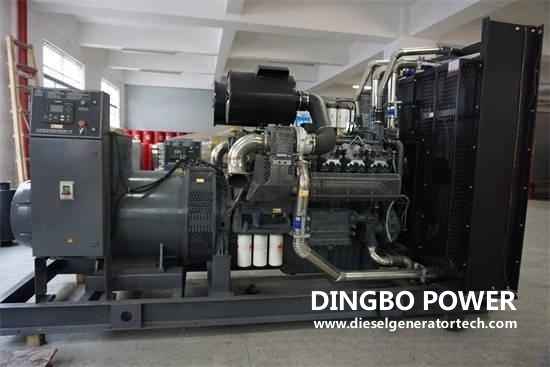A generator set - sometimes referred to as a "genset" - is a unit of equipment consisting of an engine, a generator (alternator) and is used to generate electricity from fuel.
The basic working principle of diesel generators is based on the law of thermodynamics of energy conversion. According to this law, energy cannot be created or lost, but can only be transformed from one form to another.
A diesel generator converts mechanical energy (motion) into electrical power and channels it through a power cable. It is helpful to imagine that the current flows through the wire in much the same way as water flows through a pipe. The generator can be thought of as an "electric pump" which causes the current to flow through the wire. It doesn't actually create or destroy the electrons flowing through the wire, in the same way that a pump creates new water. It just makes it move in a useful way.

The diesel engine rotates the generator to produce the AC current. This is used to power electrical equipment. They can be used to provide power for a range of applications such as schools, hospitals, factories and homes. They can be used either as a mains power source or in the event of a power failure. Generators have different ratings depending on the application and there are four main ratings.
Emergency Standby (ESP) and Limited Time Power (LTP) for standby applications and Continuous (COP) and Primary Rated Power (PRP) when used as the mains power supply. Each rating is limited by the hour and load factor.
When a generator is used as a standby, it usually has what is called a transfer switch. This is a mechanical device that stops the connection of the generator to the load while the mains power is supplied. When mains power is available, connecting a generator at the same time requires parallel operation by means of a special control.
When used as the mains supply (for example, when there is no mains supply or the mains supply is too poor to be used), this is known as 'islanding mode'. Where there is a large power demand, several smaller units can be connected together in parallel using a process called synchronisation.
Diesel generators require careful routine maintenance at regular intervals. This depends on the manufacturer, but the most important item that usually needs servicing is the engine. Engines usually need servicing after 250 or 500 hours, but the service interval is defined by the engine manufacturer. If you relate this to the car, 500 hours at 50 mph or 80 km/h equates to 25,000 miles or 40,000 km!
Usually during a routine service you will have a thorough check, change the air filter, oil filter and fuel filter, change the oil and some belts such as the radiator fan belt and the charging alternator belt.
Maintaining your generator is an important part of making sure it delivers power when you need it! For more information on how diesel generators work and the amazing benefits they offer, contact the experts at Starlight.
Copyright © Guangxi Dingbo Generator Set Manufacturing Co., Ltd. All Rights Reserved | Sitemap
Update cookies preferences